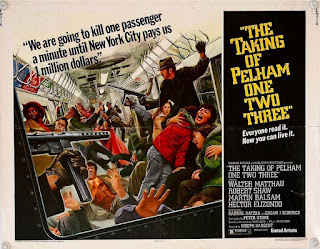As both an African-American trying to break into the entertainment business and a lover of original, thought-provoking genre cinema, I am both proud of what Jordan Peele did and thrilled that the public has across the board embraced it.
This low budget movie -- with no big name stars -- which dares to say some pretty provocative and insightful things about race, has been widely embraced by the public (it's grossed upwards of $170 million) and has managed to sidestep the inevitable backlash that normally greets break out hits (*cough* La La Land *cough*)
After seeing it the first time I immediately was compelled to see it again in theaters at a later date, I think, because like a lot of viewers. I imagined that some of its first act moments would have new meaning now that I knew the third act revelations.
This blog post will contain SPOILERS, so if you are one of the few people who aren't hip enough to have seen this masterpiece, move along.
First off, I will stay I was and am repeatedly struck by how smart the movie is. Before I saw it this time I saw several trailers that really depressed me. Among them were the smugly self-satisfied big screen Baywatch movie, which seems to want to both poke fun at the campy show but also revel in its same puerile objectification of hot bodies, and even worse Amy Schumer's upcoming comedy Snatched, which seems so culturally tone deaf -- it's about privileged white women who get kidnapped during a getaway in Latin America -- that it seems like it belongs in another decade.
 |
| This man deserves an Oscar nomination |
The movie is also effortlessly funny and comfortable in its pacing. It is never boring, but unlike so many broader comedies if makes no effort to smother you with "bits." The closest thing to a purely silly joke -- Allison Williams eating individual Fruit Loops while cruising for NCAA athletes -- is so pitch perfect and well earned that the movie gets away with it.
And a word on Allison Williams' performance. I have never watched Girls and likely never will so I have nothing to gauge her work here against, but her role is the one that plays most curiously on second viewing.
Was her rebuff of a traffic cop about not wanting her black boyfriend's identity known, therefore eliminating anyone tracing him back there? Her attempts to play flirt with her boyfriend's best friend (played brilliantly by Lil Rel Howery) also a scheme to lure him to become her next victim?
She has to walk this very careful line between being cute and loyal and yet, also somewhat suspicious. I have heard people claim that they thought she was up to no good from the beginning. But I am not so sure. I remembered wondering if she was "in" on it, but her reactions seemed genuine at the time, but on second viewing there are little hints at a rehearsed nature to her embarrassment at her families' behavior.
There are also other little interesting bits that pay off -- for instance that image of the 'groundskeeper' running -- which is unsettling in both the trailer and the film -- is a callback to the fact that the grandfather (who lives inside him) never quite got over losing to Jesse Owens at the 1936 Olympic Games.
And the joys of the movie don't end there -- not that there will ever be a sequel -- but the concept of "The Sunken Place" is very ripe for deeper exploration, as if the idea of this pseudo secret society (which borrows a big from Being John Malcovich) that wants their brain to live on as their bodies give way to father time.
I have no idea if Peele could ever top this film, but he has made a piece of art that will last and stand the test of time, that much I know for sure.












